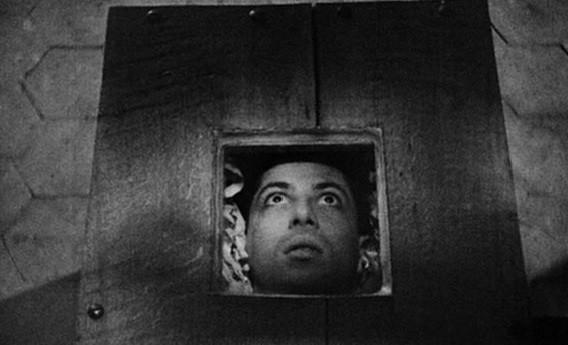Sometimes the only way we can deal with impressive but utterly irrational things humans do is by mythologizing them. We transform these people into heroes. We have to rationalize their actions some way, so we impose significance where there may just be none. I'm not sure how intentional it is, but Big River Man ends up being an investigation of just that phenomenon.
The 'Big River Man' is Martin Strel, a middle-aged, overweight Slovenian man who suddenly decided to dedicate his life, or what's left of it, to endurance swimming. He's also carved out a rather unique niche in endurance swimming: he likes to swim in heavily-polluted rivers. He set a record by swimming the Yangtze, the world's most polluted river. So polluted was it, the narration tells us, he had to have his blood cleaned by machine every day because human kidneys can't handle that level of toxicity. It's not clear why Strel does this. This isn't the fault of the documentarian. Rather, it's the fault of Martin Strel. He doesn't know why he does what he does. Strel just seems to have an irrational urge to suffer and take risks. Strel's son, also his publicist, claims Strel is trying to bring attention to environmental issues. Did I note Strel's son is a publicist? The documentary undermines his claims by showing him making up statements to heroize his father's exploits. Strel, on the other hand, rarely has anything to say about his exploits: he just does them.
Big River Man's focus is on Strel's latest and most extreme swim yet: swimming the Amazon, from Peru to Brazil. It takes 70 days of swimming a several dozen miles every day. Making things even more difficult, Strel doesn't lose any weight in preparation and refuses to quit his heavy drinking. Even while swimming, his water bottles are actually filled with whiskey. It's as if he desires the event to be as agonizing an ordeal as possible. He seems to stack the odds against himself, as if desiring failure. But he's an obsessive man. He has trouble to walk each evening when he emerges from the river, yet he only sleeps for four hours each night and sometimes wants to swim even at night. The film tracks the increasingly alarming conditions of Strel's body and mind. One of the most disturbing moments is when his head is infested with some parasite and he's pretty much lost his mind, he starts hooking his head up to batteries and shocking himself. He also begins taking off swimming without telling his party, putting himself and the expedition at great risk. They ask him why. He says he doesn't know.
His odd behaviour begins to affect some crew members, particularly his navigator, a young Wisconsin fisherman. He begins reflecting on Strel as a Christ figure and explaining that the river is purgatory. Most of his ranting is annoying, but seems genuine. This struck me as one of the most interesting moments in the film, because it illustrates what I say in the first paragraph: the attempt to make sense of the irrational. The navigator believes Strel is a real hero, suffering for mankind, just like Jesus. Really, Strel is a disturbed man and if he had died in that river, his son and the navigator should both have been charged with negligent manslaughter. In fact, Strel nearly does die; at the end of the expedition he is in a nearly catatonic state.
Big River Man thus ends up being more sociologically rather than psychologically interesting. The psychology is absent because Strel has nothing to offer: he is presented as pure action and that's probably how he presents himself quite purposely. Sociologically, the heroizing and the mystic fervor that overtakes both Strel and his navigator are very fascinating. It's even revealing about the religious mind. Many of the Catholic saints, particularly St. Francis of Assisi, seemed to share Strel's madness and they too had their personal hagiographers.
I found myself wondering less, "What makes this man do this?" and more "What makes this man worthy of a documentary?" Well, his exploits are admittedly quite remarkable. But he's no hero. No more than Alain Robert, the man who climbs skycrapers without any climbing aids other than chalk dust. Both of these people risk their lives for totally self-interested achievements. Their activities yield nothing of value for humanity. As for himself, Strel squanders all the money he makes from the exploit on gambling very quickly and I wonder if he even cares about what he achieved. This makes the whole expedition seem strangely nihilistic.
Maringouin certainly gets some good footage, as well as some inane footage, and stumbles onto interesting points. However, the organization reveals a certain confusion regarding just what the film is about. The title would indicate it's about Strel, but his inscrutibility leaves his documentarian out to dry and the audience occasionally very bored. I recall checking the time--sometime I rarely do during movies--and being dismayed to find it was only five minutes since I had last checked the time. Still, while no-one studies weirdos as well as Errol Morris and Werner Herzog, Big River Man is a good and fascinating look at a madman heroized by the confused.
3/4
Help make this site more interesting through discussion:
Big River Man (2009) - 3/4
Author: Jared Roberts
Subscribe to:
Post Comments (Atom)


0 comments:
Post a Comment